Pritam Siwach: Smashing Patriarchy With A Hockey Stick & Unbridled Passion
Pritam Siwach: Smashing Patriarchy With A Hockey Stick & Unbridled Passion
Share
Dashing forward Pritam Rani was undisputed queen of the hockey turf during her hey day. Her international career spanned a record 17 years. The diminutive dynamo is the only mother of two to play for the country! Her zeal and enthusiasm still continues in the form of mentoring a highly successful Academy. Three of her finds are in the current Indian national team. Not to mention her son who dons the country’s colours – Editor.
By TAZEEN QURESHY
In the early 1980s, a young girl stood on a kho-kho ground of a government school waiting for her chance to play. The school in Jharsa in Gurugram, Haryana, where she studied, was famous in the neighbouring villages for its hockey team. She also wanted to be a part of it, but was denied.

“Tum healthy ho. Nahin khel paogi. (You are healthy. You won’t be able to play),” she would be told by the seniors and coaches.
Almost every day, she would return home sulking and lost and narrate the incident to her grandmother, who would console her.
“But, I want to play and I need a hockey stick,” the girl would complain every day until her grandmother went to the neighbours and asked for a hockey stick.
That is how Pritam Rani Siwach, former India women’s captain and one of India’s most successful players, got her first hockey stick – a borrowed one.
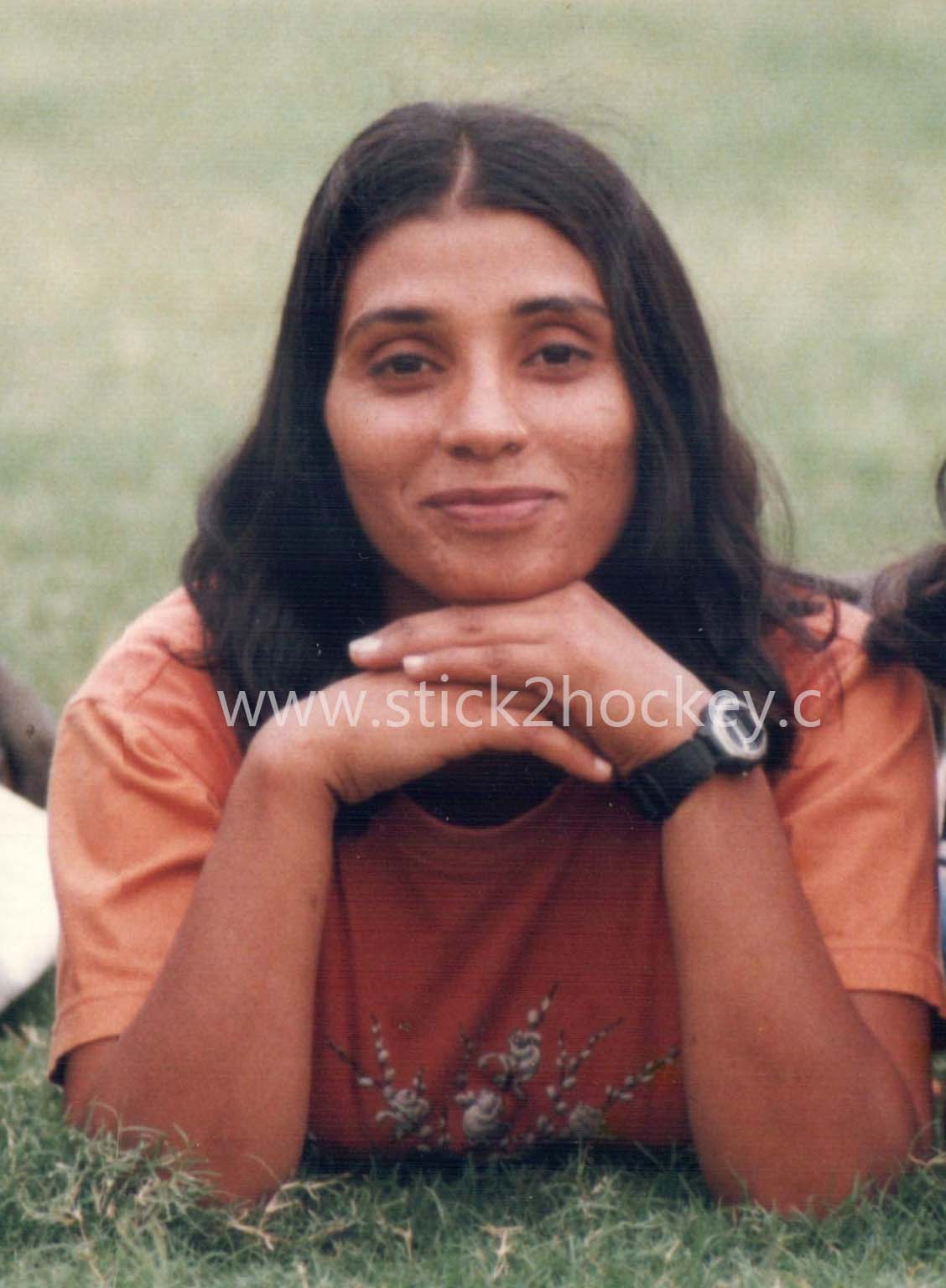
Pritam in a joyous mood
“Coming from a family of farmers, it wasn’t financially feasible for my family to fulfil all our demands. So, my grandmother got me a borrowed stick. But even after I had a hockey stick, I was not allowed to play. I would be asked to stand in a corner and wait for my turn which never came. I would gather some pebbles and try dribbling with it,” she says with a laugh.
Pritam’s Physical Education teacher, late Tara Chand, spotted her passion and decided to give her a chance. She didn’t disappoint him and thus began the hockey journey of Pritam Rani Siwach.
The journey wasn’t easy. Her coach was very strict and would punish her for slightest of the mistakes. But that is what shaped her into a good player, she believes.
From the school team, she climbed up the success ladder and was eventually selected for the Haryana state team. “It was a big moment for me. I was representing my state. I was happy but somewhere in my heart I knew I wanted more. I wanted to wear the Indian jersey.”
However, her dreams were not supported by her extended family. Her male relatives pressurised her father to get her married.
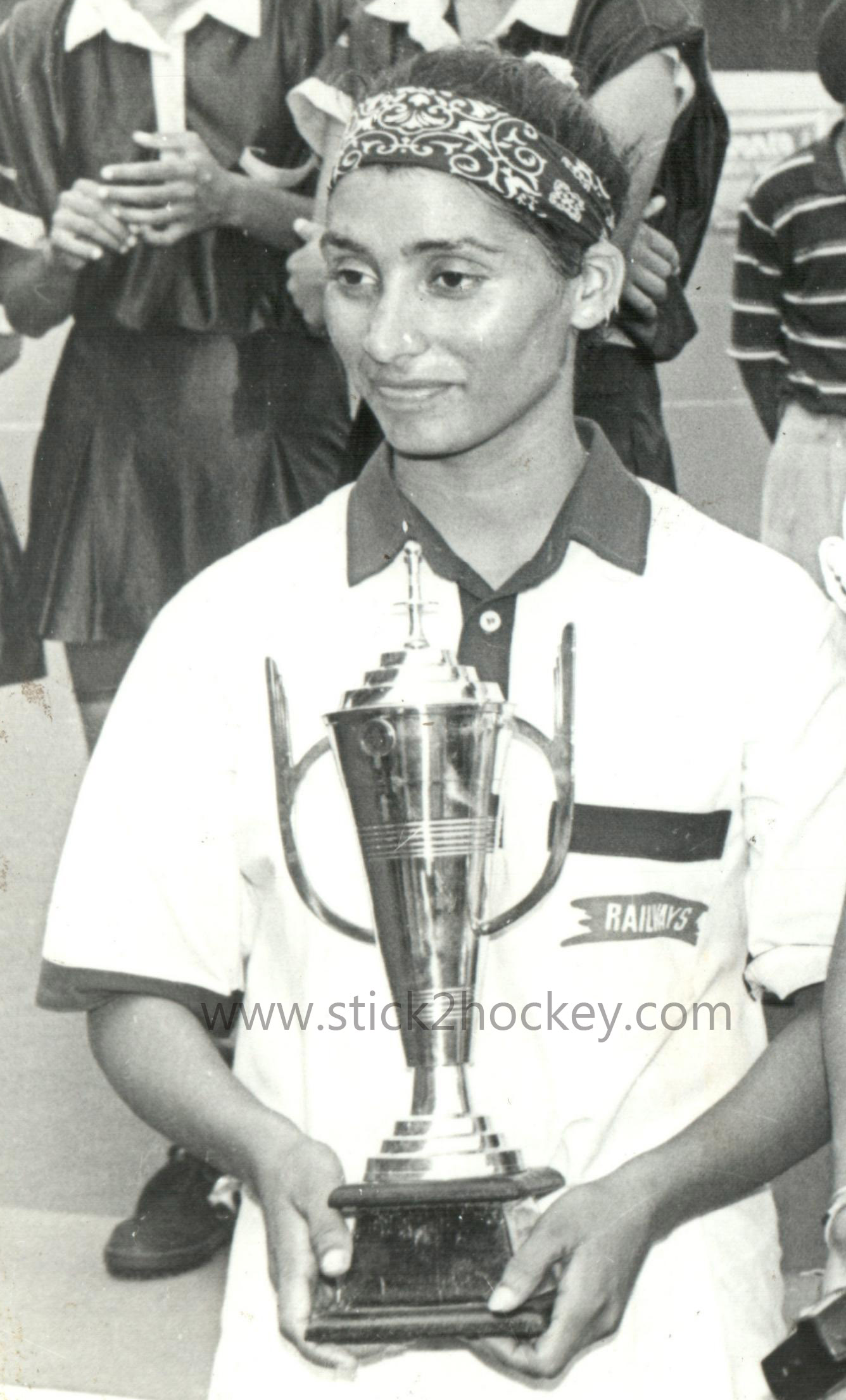
Early laurels, Chennai Nationals
“In a village set-up, it was common for young girls to marry early. The marriage of my elder sister was fixed and my uncles told my father to get me married as well. Since we lived in a joint family, my father had to oblige to their demands and started my marriage preparations.”
Pritam decided to be brave and stand up for her dreams. She spoke to her mother, who was supportive. Then she approached her father, who rejected her decision outright. After a lot of pleading and crying, her father gave her only two-years to play hockey.
“Honestly, I was buying time. My plan was to get selected into the Indian team so that my family would have no issues to let me continue playing hockey. Selection for the Indian team used to happen in the Nationals and I would give more than 100 per cent in it,” says Pritam.
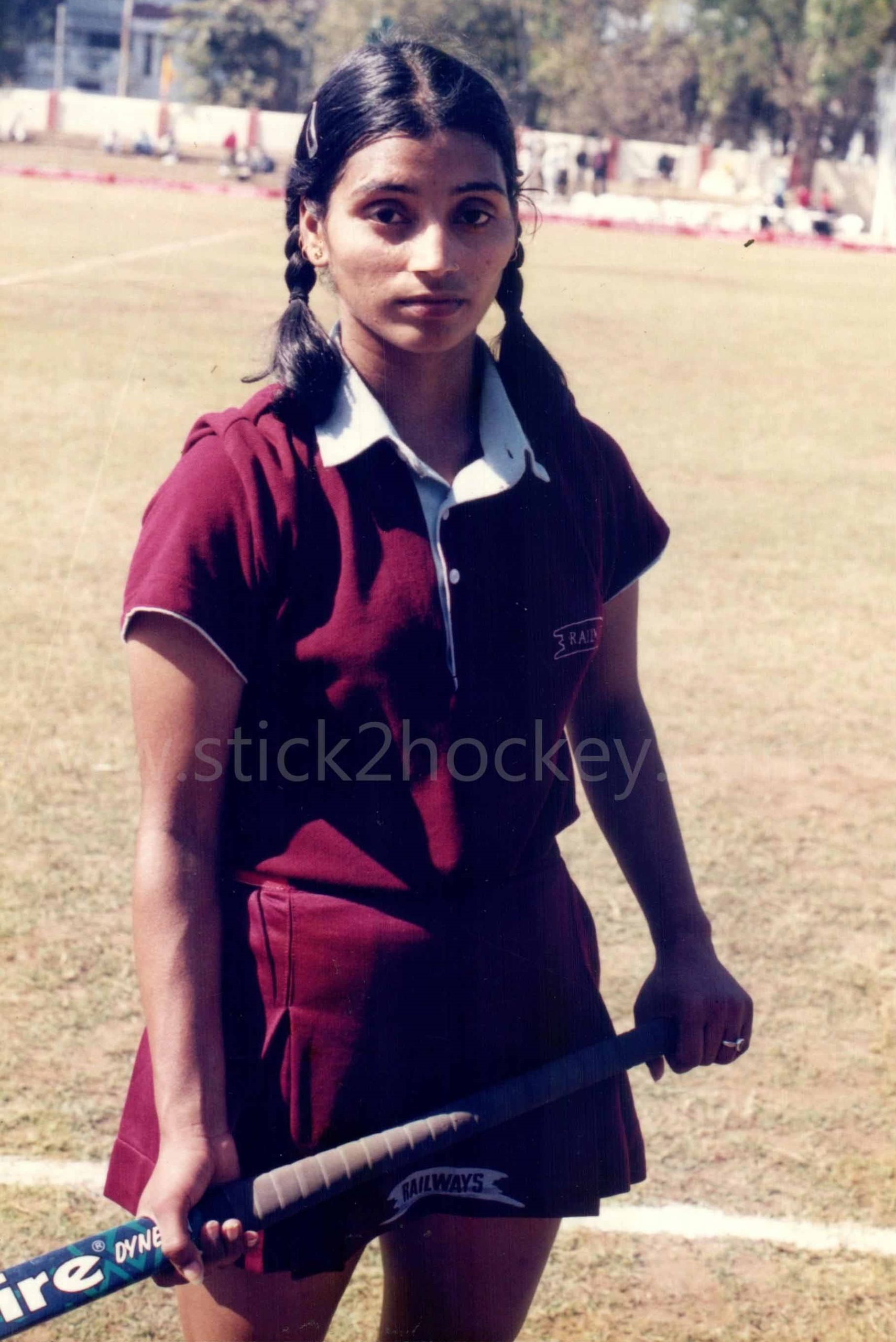
Pritam was byword for determination
Once again, her idea worked and she was called for the national camp. Initially, she was made part of the Indian senior team, but later asked to play for the junior team first as she was the youngest. Her first tournament in the Indian team was playing the Indira Gold Cup at Chandigarh in 1991. A year later, she went to play her first overseas trip – the Junior Asia Cup in Kuala Lumpur, Malaysia.
“I was very excited to play at an international venue and sit on an aeroplane. However, the tournament didn’t go as we expected. We had practiced a lot but still were losing games. I was younger and was not able to understand what was going wrong. We did win a bronze and I became the top scorer in the tournament.”
Back home, Pritam had become a star. She was famouly called as Jharsa ki Rani’. Upon her return, she was welcomed in her village with dholaks, and a lot of singing and dancing. Job offers from Air India, Railways also started pouring in. The two-year ‘deal’ of playing hockey with her father was forgotten. She continued to play and prosper and became a regular in the senior Indian team.
Pritam, in fact, led the Indian team to win silver in the 1998 Asian Games. This was India’s first appearance in the final of Asian Games in 16 years. Accolades didn’t wait and she was conferred with the Arjuna Award. ‘Arjuna’ women’s hockey player after 14 years!
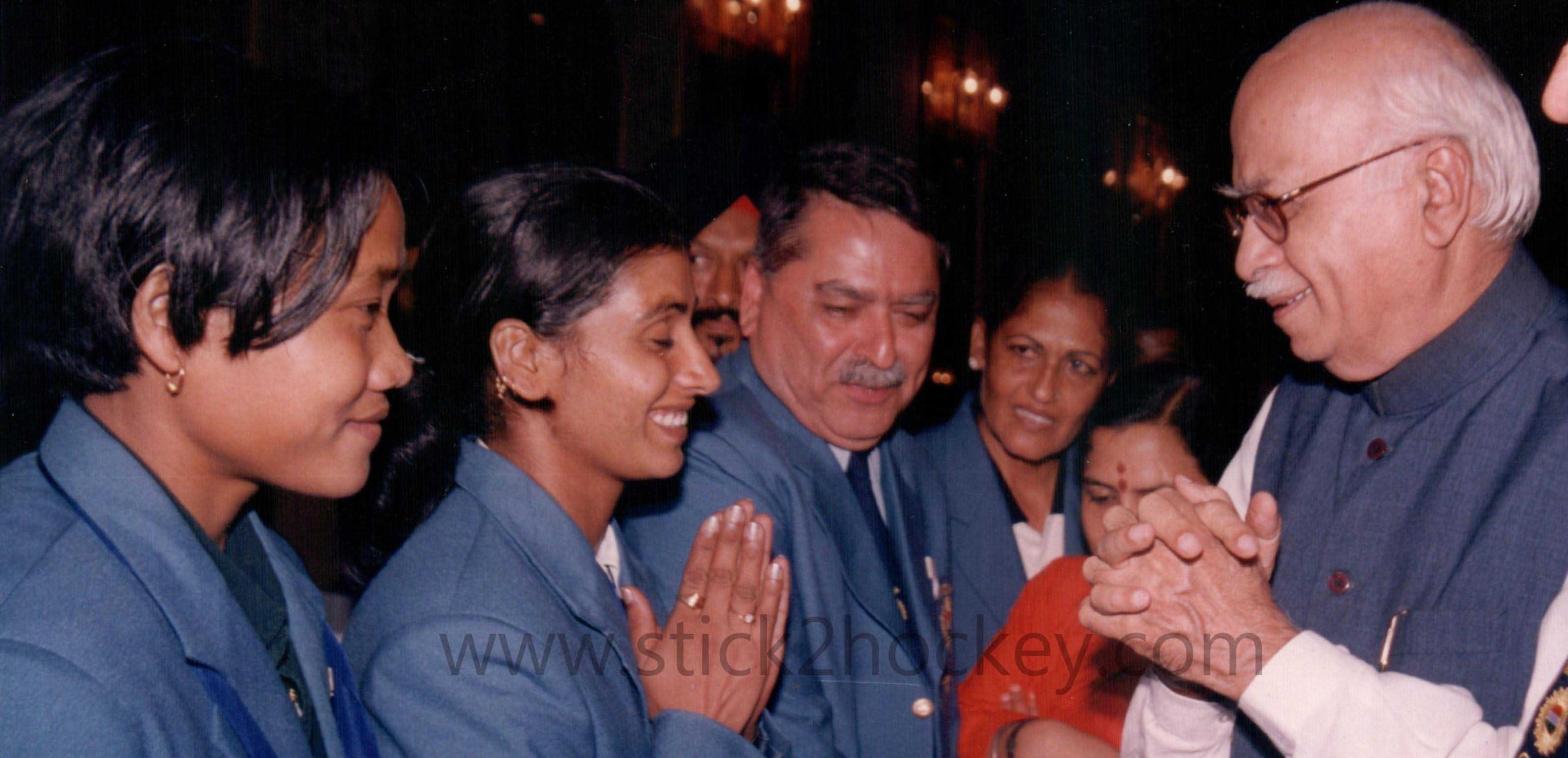
Meeting Dy Prime Minister (r) and Sports Ministers (partly hidden) after the CWG Gold, 2002
“Everything was going well, but I had turned 24. So, the marriage episode made a re-entry,” Pritam laughs. This time, it was difficult to convince her parents to give up on the idea of her marriage. “Captain ban gayi. India Khel gayi. Award bhi mil gaya. Aur kya chahiye? (You have become a captain, played for the Indian team and also got awards. What else do you need?” her family would say.
Fortunately, the marriage proposal had come from a hockey player, who like Pritam, represented the Railways. “It was time to make another ‘deal.’ Allow me to play even after marriage, I told him. He thought I was joking and casually agreed. But I was straight up – I will marry only if I am allowed to play.”
Her husband Kuldeep agreed and they got married in February 1999. But, she conceived soon after and became pregnant. “Of course I was happy and my son was born in 2000. But there was also a thought of my career, which I thought was fading away. I shared my emotions with my husband, who told me I should start playing.”
Three months after her son was born, Pritam was back on the ground for her training. Fitness became the most crucial part as she had gained 74kgs. She was also breast-feeding her son, so she felt weak. Her husband would take care of her diet and bring unadulterated milk for her, while her mother-in-law would take care of her infant son.
“The taunts were brutal. Some of them would taunt me for leaving my child and playing. Others would make fun that I had gained weight and was trying to play a sport. But Kuldeep asked me not to bother. My in-laws lived in a joint family set-up. So, to maintain peace in the family, I would complete my share of work, take care of my child and also focus on my training. It was difficult, but when was breaking societal conventions easy for women?” she asks.
Much before boxer Mary Kom’s comeback after delivering a child left everyone stunned in India, Pritam Rani Siwach had already done the impossible. She was not only called back to the camp but also made it to the squad of the 2002 Commonwealth Games.
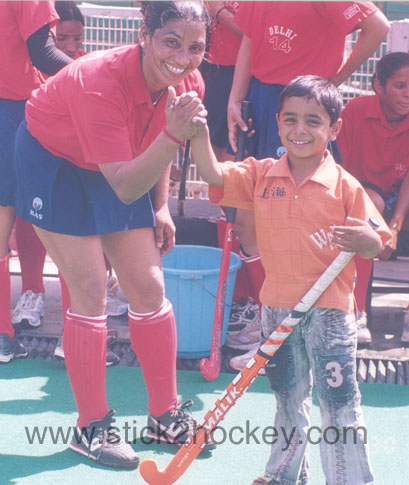
Pritam engaging her son at half time of a match.
“The greatest moment of my career was the Commonwealth Games. It was a comeback of sorts for me. I had left my child at home and come so far to play. I wanted to settle for nothing less than gold. Our team was an underdog and not much was being expected from us. But, we took advantage of the minimal chances we got and won the gold. Our achievement was so inspiring that the movie ‘Chak De’ was made on us,” she says.
In 2004, she started an academy in Sonepat, where she trains young girls for free. “I don’t want other girls to face the hardships that I had to go through. Though I have minimal resources, but I believe the training is going well. Most of the players in the Haryana team are from my academy. Players like Neha Goyal, Sharmila and Nisha have played for the Indian team.”
In 2005, her daughter was born and a year later, Kuldeep encouraged her to pursue a formal coaching course in NIS, Patiala. “While undergoing that course, the thought of playing for India again crossed my mind. This time when I told my husband, he started laughing. But, I had certain madness in me that had helped me succeed so far. With the same zeal, I started training and made it to the Olympic qualifiers team in 2008. Unfortunately, we couldn’t qualify and that was the last time I played for India,” said the mother of two.
After causing such a damage to the rivals the wrecker-in-chief strikes a goal.
Her tryst with Indian hockey was still not over. She took over as the coach of the team for the 2010 Commonwealth Games. “But, coaching in my academy and the India team are two different things. Coaching Indian team is easier because you get a lot of support in terms of analytical coach, video analysis. When it comes to training the grassroot level players, you are creating a base for them. If the base is not strong, then the entire career can go to waste. So, I started focussing more on my academy.”
Pritam Rani has inspired a generation of players to break from stereotypes and social conventions to listen to their heart. She has only one message for other women:
“These days the slogan ‘Beti Bachao, Beti Padhao’ is very famous. But, it should be ‘Beti Bachao, Beti Padhao and Beti Khilao.’ As women, we have to stand for ourselves and at times also against our family. But if your ambition is pure, you should go for it, no matter what. Don’t let people subdue you just because you are a woman.”
PRITAM UNDOUBTEDLY IS A WOMEN OF SUBSTANCE

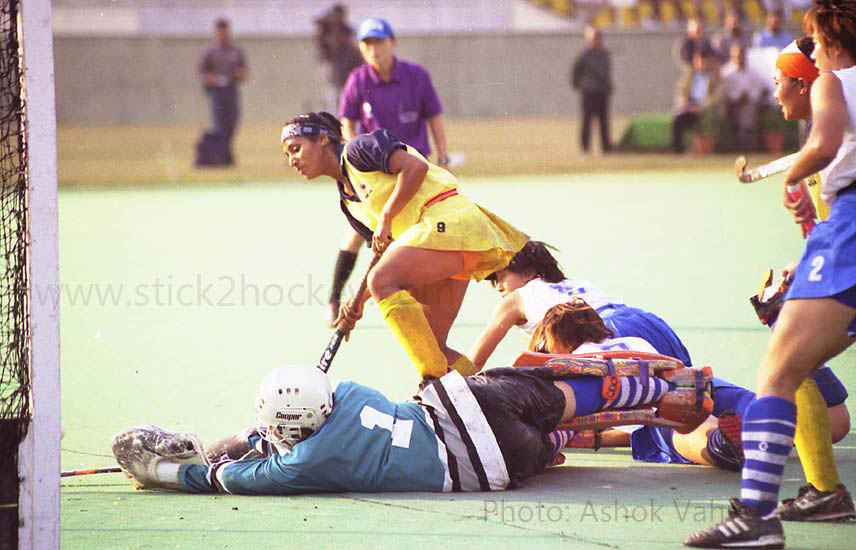
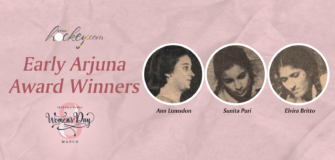

Good
Pritam’s dedication as a mentor n coach to the underprivileged aspirants is worthy of her getting more recognition.
I would like to believe that she gets Dronacharya Award in the near future.
This will inspire many more sports women to follow heir dreams with passion .
My congratulations to her and Kuldeep on Womens International day
Very nice